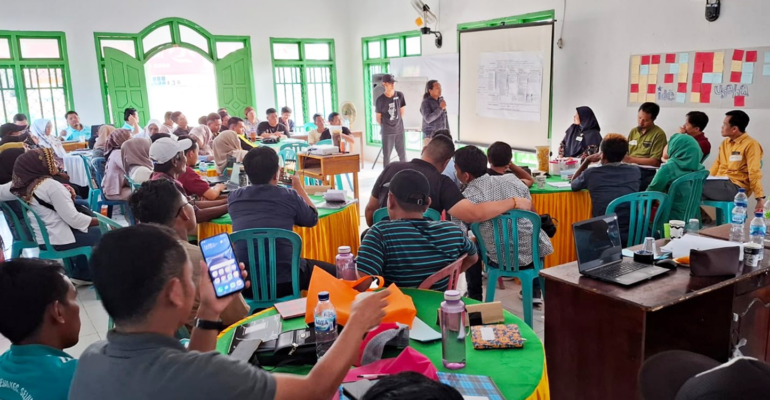SB IPB University Faculty Members Develop Social Enterprises Based on Local Potential to Address Human-Wildlife Conflicts

Faculty members from the School of Business (SB) at IPB University recently served as speakers in a training program titled “Development of Community-Based Social Enterprises to Support Efforts in Addressing Conflicts Between Wildlife and Residents in Villages Surrounding National Parks.”
The training, held at the Labuhan Ratu IX Village Hall in Lampung, was a collaborative effort between Way Kambas National Park (TNWK) and the Wildlife Conservation Society Indonesia Program (WCS-IP). The program aimed to enhance the economic welfare of community groups in conservation areas while strengthening efforts to address conflicts between humans and wildlife.
The training attracted a total of 40 participants, including women’s groups. The participants were social entrepreneurs already engaged in group initiatives aimed not only at improving their members’ economic well-being but also contributing to conservation efforts and mitigating human-wildlife conflicts.
This training also sought to bolster social enterprise initiatives in various villages surrounding conservation areas. Furthermore, the success of these social enterprises is expected to increase the role of community groups in conservation efforts and reduce illegal activities within protected areas.
The enterprises developed by these community groups are sustainable businesses based on local potential, utilizing natural resources wisely without damaging ecosystems. Examples include the cultivation and production of medicinal plants, the processing of non-timber forest products, and community-based ecotourism, all designed to strengthen the local economy while preserving environmental balance.
SB IPB University sent two faculty members, Dr Suhendi and Agustina Widi, MM, who delivered material on designing social enterprises using the Business Model Canvas (BMC) approach, strengthening institutional capacity, and training on group business financial management.
Knowledge of BMC and financial training is key to the success of social enterprises. The BMC helps in designing a clear and effective business model, while financial training ensures that social enterprises can manage their resources well and achieve long-term sustainability.
“The combination of these two elements enables social enterprises to maximize their social impact while maintaining the sustainability and growth of their business,” said Dr Suhendi.
On the other hand, the material on institutional strengthening, which focuses on regulations, plays a crucial role in ensuring that business groups can operate efficiently, transparently, and sustainably. These regulations help form a clear organizational structure, establish decision-making mechanisms, increase transparency, manage financial governance, reduce legal risks, and support adaptation and growth.
“With strong and well-developed regulations, business groups can achieve their goals more effectively and sustain their operations in the long term,” explained Agustina Widi, MM.
This collaboration is expected to serve as a good example of building synergy between education, conservation, and community economic development, and as the first step in a series of activities that will strengthen conservation efforts through sustainable social and economic approaches.
In addition to SB IPB University, the training featured speakers from social enterprises such as PAYUNGI, the Department of Community Empowerment, the Department of Cooperatives and SMEs, the East Lampung Regency Labor Office, and academics from Nahdlatul Ulama University of Lampung.
The training was attended not only by various farmer groups and women’s groups from the TNWK area but also by community groups from around Bukit Barisan Selatan National Park (TNBBS) and the Bukit Balai Rejang Selatan (BBRS) landscape in Bengkulu, as well as extension workers from both national parks and human-wildlife conflict task forces. The diversity of training participants is expected to provide a platform for sharing knowledge and experiences between groups. (*/Rz) (IAAS/RUM)



